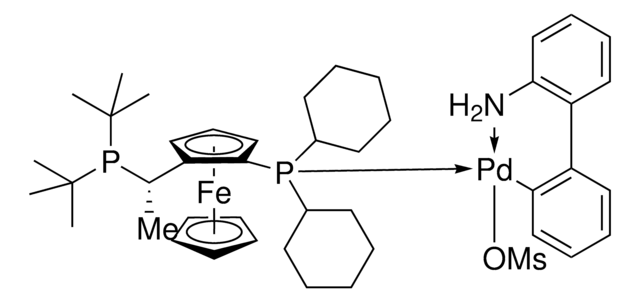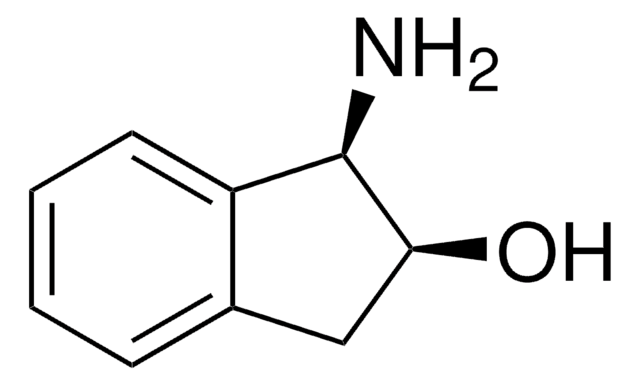804568
(R,S)-Bode Kinetic Resolution Catalyst
Synonyme(s) :
(4aR,9aS)-6-Bromo-4-hydroxy-4,4a,9,9a-tetrahydroindeno[2,1-b][1,4]oxazin-3(2H)-one
About This Item
Produits recommandés
Forme
solution
Niveau de qualité
Température de stockage
15-25°C
Chaîne SMILES
O=C(CO1)N(O)[C@@]2([H])[C@]1([H])CC3=CC=C(Br)C=C32
InChI
1S/C11H10BrNO3/c12-7-2-1-6-3-9-11(8(6)4-7)13(15)10(14)5-16-9/h1-2,4,9,11,15H,3,5H2/t9-,11+/m0/s1
Clé InChI
FQXSUQCCAHKURK-GXSJLCMTSA-N
Application
It can also be employed in the preparation of nonracemic piperidines by kinetic resolution using an α-hydroxy-α′, β-unsaturated ketone in the presence of a pyrrolotriazolium salt.
Mention d'avertissement
Warning
Mentions de danger
Conseils de prudence
Classification des risques
Acute Tox. 4 Oral
Code de la classe de stockage
11 - Combustible Solids
Classe de danger pour l'eau (WGK)
WGK 3
Point d'éclair (°F)
Not applicable
Point d'éclair (°C)
Not applicable
Certificats d'analyse (COA)
Recherchez un Certificats d'analyse (COA) en saisissant le numéro de lot du produit. Les numéros de lot figurent sur l'étiquette du produit après les mots "Lot" ou "Batch".
Déjà en possession de ce produit ?
Retrouvez la documentation relative aux produits que vous avez récemment achetés dans la Bibliothèque de documents.
Contenu apparenté
The Bode Group aims to develop new reactions and reagents for the synthesis of complex molecules. The Bode Group has developed N-mesityl-substituted NHCs as organocatalysts for the catalytic generation of reactive species including activated carboxylates, homoenolates, and enolates. These novel catalysts and reactions have made possible a new generation of highly enantioselective annulations from simple starting materials under mild reaction conditions, usually at room temperature and without added reagents. Furthering the goal of designing new reagents to enable the assembly of complex molecules, the Bode group has developed SnAP reagents for the facile, one-pot conversion of aldehydes into N-unprotected, saturated N-heterocycles, including bicyclic and spirocyclic structures. These easy to handle reagents provide a simple and robust alternative to the challenging and restrictive cross-coupling methods for the functionalization of saturated N-heterocycles.
The Bode Group aims to develop new reactions and reagents for the synthesis of complex molecules. The Bode Group has developed N-mesityl-substituted NHCs as organocatalysts for the catalytic generation of reactive species including activated carboxylates, homoenolates, and enolates. These novel catalysts and reactions have made possible a new generation of highly enantioselective annulations from simple starting materials under mild reaction conditions, usually at room temperature and without added reagents. Furthering the goal of designing new reagents to enable the assembly of complex molecules, the Bode group has developed SnAP reagents for the facile, one-pot conversion of aldehydes into N-unprotected, saturated N-heterocycles, including bicyclic and spirocyclic structures. These easy to handle reagents provide a simple and robust alternative to the challenging and restrictive cross-coupling methods for the functionalization of saturated N-heterocycles.
The Bode Group aims to develop new reactions and reagents for the synthesis of complex molecules. The Bode Group has developed N-mesityl-substituted NHCs as organocatalysts for the catalytic generation of reactive species including activated carboxylates, homoenolates, and enolates. These novel catalysts and reactions have made possible a new generation of highly enantioselective annulations from simple starting materials under mild reaction conditions, usually at room temperature and without added reagents. Furthering the goal of designing new reagents to enable the assembly of complex molecules, the Bode group has developed SnAP reagents for the facile, one-pot conversion of aldehydes into N-unprotected, saturated N-heterocycles, including bicyclic and spirocyclic structures. These easy to handle reagents provide a simple and robust alternative to the challenging and restrictive cross-coupling methods for the functionalization of saturated N-heterocycles.
The Bode Group aims to develop new reactions and reagents for the synthesis of complex molecules. The Bode Group has developed N-mesityl-substituted NHCs as organocatalysts for the catalytic generation of reactive species including activated carboxylates, homoenolates, and enolates. These novel catalysts and reactions have made possible a new generation of highly enantioselective annulations from simple starting materials under mild reaction conditions, usually at room temperature and without added reagents. Furthering the goal of designing new reagents to enable the assembly of complex molecules, the Bode group has developed SnAP reagents for the facile, one-pot conversion of aldehydes into N-unprotected, saturated N-heterocycles, including bicyclic and spirocyclic structures. These easy to handle reagents provide a simple and robust alternative to the challenging and restrictive cross-coupling methods for the functionalization of saturated N-heterocycles.
Notre équipe de scientifiques dispose d'une expérience dans tous les secteurs de la recherche, notamment en sciences de la vie, science des matériaux, synthèse chimique, chromatographie, analyse et dans de nombreux autres domaines..
Contacter notre Service technique![(5aR, 10bS)-5a, 10b-Dihydro-2-(2′2, 4′,6′-trimethylphenyl)-4H, 6H-indeno[2,1-b]-1,2,4-triazolo[4, 3-d]-1,4-oxazinium chloride 93%](/deepweb/assets/sigmaaldrich/product/structures/104/483/183b49bc-426f-411b-8d11-71bbd4b81022/640/183b49bc-426f-411b-8d11-71bbd4b81022.png)
![(R)-1-[(SP)-2-(Diphenylphosphino)ferrocenyl]ethyldicyclohexylphosphine ≥97%](/deepweb/assets/sigmaaldrich/product/structures/245/493/2ae2dd8a-65cc-4aba-9a1f-1292eb1ad8e0/640/2ae2dd8a-65cc-4aba-9a1f-1292eb1ad8e0.png)


![(R)-1-[(SP)-2-(Diphenylphosphino)ferrocenyl]ethyldi-tert-butylphosphine ≥97%](/deepweb/assets/sigmaaldrich/product/structures/168/768/54a48841-6fe6-437a-81af-8c2e54117ef3/640/54a48841-6fe6-437a-81af-8c2e54117ef3.png)
![(R)-1-[(SP)-2-(Dicyclohexylphosphino)ferrocenyl]ethyldi-tert-butylphosphine ≥97%](/deepweb/assets/sigmaaldrich/product/structures/809/974/e027b628-7c2e-4bde-be7e-f9298d0c8b04/640/e027b628-7c2e-4bde-be7e-f9298d0c8b04.png)
![(R)-3,3′-Bis[3,5-bis(trifluoromethyl)phenyl]-1,1′-binaphthyl-2,2′-diyl hydrogenphosphate 95%](/deepweb/assets/sigmaaldrich/product/structures/270/636/14dc9413-bcb4-478c-8e4d-3605317c13a5/640/14dc9413-bcb4-478c-8e4d-3605317c13a5.png)

![(R)-N-[(1R,2R)-2-(3-(3,5-Bis(trifluoromethyl)phenyl)ureido)cyclohexyl]-tert-butyl-sulfinamide 96%](/deepweb/assets/sigmaaldrich/product/structures/389/070/18847164-c6a7-4b4e-abcb-2dbc22493a2d/640/18847164-c6a7-4b4e-abcb-2dbc22493a2d.png)

